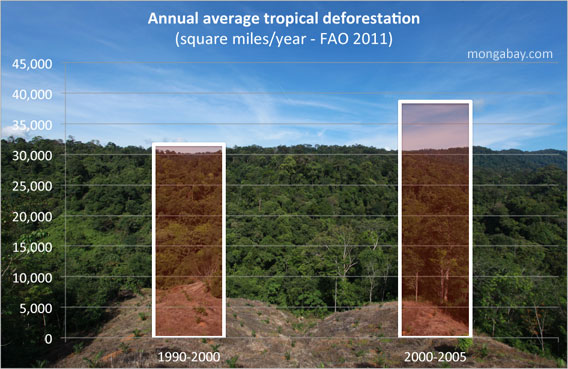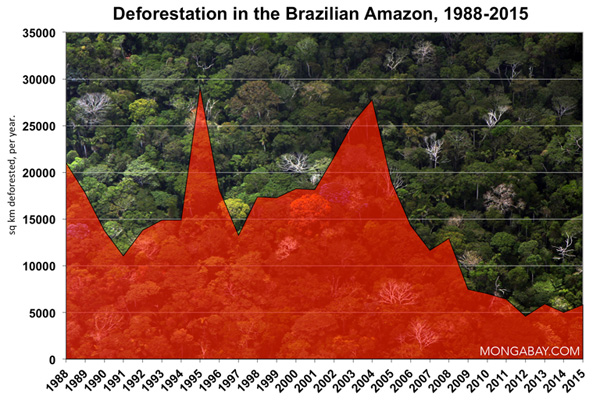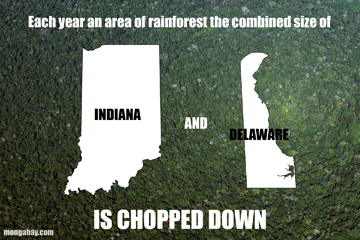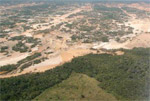
Global deforestation according to the U.N. Click to enlarge
Greenpeace reiterated its call for an end to deforestation in Brazil by 2015 and globally by 2020 during its launch of an awareness-raising expedition down the Amazon River aboard the Rainbow Warrior.
“Brazil is now the sixth largest economy in the world, the largest meat exporter and second largest grain exporter. Brazil’s rise to become the world’s sixth largest economy coincided with consecutive years of decline in deforestation in the Amazon,” said Kumi Naidoo Greenpeace International Executive Director. “Brazil must lead as an example of sustainable development without forest destruction for other forest countries like Indonesia and the Congo.”
The Greenpeace voyage is timed to end in Rio around the start of the Rio+20 conference on sustainable development. The conference is expected to attract thousands of business and political leaders, as well as scientists, activists, and academics.
While the annual deforestation rate in the Brazilian Amazon has fallen by nearly 80 percent since 2004, environmentalists fear the country’s politicians may backslide on their commitment toward greener economic growth.

Annual deforestation in the Brazilian Amazon. Click image to enlarge
“Brazil could be the example of an economic super power that continues to grow without recklessly destroying the forests. However, actions over the past year by President Dilma and the Brazilian congress show that we are at risk of failing to achieve this,” said Paulo Adario, Greenpeace Brazil’s Amazon Campaign Director. “It will only be with a strong legal framework that Brazil will have the necessary tools to continue to fight deforestation.”
Greenpeace has therefore launched a petition calling for a “zero deforestation” law in Brazil. It is seeking 1.4 million signatures of Brazilian voters for the initiative.
“The proposed law is an initiative started after the blatant dismissal of widespread public opposition to the new Forest Code law by the Government in favor of vested agribusiness influence,” said Greenpeace in a statement. “Brazil’s Amazon Rainforest is currently facing intense pressure from cattle ranchers, the agriculture sector, loggers and large infrastructure projects all threatening to undo legislation that has helped to protect the forests of Brazil for years.”
Brazilian lawmakers and President Dilma Rousseff are currently weighing a revision to the country’s forest code, which governs how much forest a landowner is permitted to clear. Environmentalists fear the legislation could grant amnesty for landowners who illegally cleared millions of hectares of rainforest. Supporters of the revision say it could make the Forest Code clearer and easier to enforce while allowing Brazil to expand export-driven agriculture deeper into the Amazon.
A vote on the measure is expected in coming weeks. Greenpeace is urging President Rousseff to reject the revision.
 Click to enlarge |
Deforestation remains a critical environmental issue globally. More than half of Earth’s terrestrial plant and animal species reside in tropical forests, while deforestation and forest degradation account for 10-15 percent of greenhouse gas emissions. Forests also provide important ecosystem services, including maintenance of rainfall and moderation of local climate, that form the basis of rural and urban economies. For example, roughly 70 percent of GDP in South America is produced within the rain shadow of the Amazon rainforest.
Greenpeace is not alone in its target. WWF, one of the world’s largest environmental groups, has a zero “net” deforestation target for 2020.
Related articles
Rally calls on Brazil President to veto new forest code

(03/07/2012) A coalition of 200 organizations, known as the Comitê Brasil in Defense of Forests and Sustainable Development, rallied today in Brasilia against proposed changes to Brazil’s Forestry Code. The code, which was supposed to be voted on this week but has been delayed to shore up more support, would make changes in over 40-year-old code that some conservationists fear could lead to further deforestation in the Amazon. Protestors called on the President of Brazil, Dilma Rousseff, to veto the bill as it stands now, holding signs exclaiming, “Veta Dilma!” (“Veto it Dilma!”).
(12/06/2011) The Brazilian Senate tonight passed controversial legislation that will reform the country’s 46-year-old Forest Code, which limits how much forest can be cleared on private lands. Environmentalists are calling the move “a disaster” that will reverse Brazil’s recent progress in slowing deforestation in the world’s largest rainforests.
Soy moratorium in Amazon maintaining its effectiveness
(10/14/2011) The moratorium on clearing Amazon rainforest for soy farms in Brazil appears to be maintaining its effectiveness for a fifth straight year, reports the Brazilian Association of Vegetable Oil Industries (ABIOVE).
Corporations, conservation, and the green movement

(10/21/2010) The image of rainforests being torn down by giant bulldozers, felled by chainsaw-wielding loggers, and torched by large-scale developers has never been more poignant. Corporations have today replaced small-scale farmers as the prime drivers of deforestation, a shift that has critical implications for conservation. Until recently deforestation has been driven mostly by poverty—poor people in developing countries clearing forests or depleting other natural resources as they struggle to feed their families. Government policies in the ’60s, ’70s, and ’80s had a multiplier effect, subsidizing agricultural expansion through low-interest loans, infrastructure projects, and ambitious colonization schemes, especially in the Amazon and Indonesia. But over the past two decades, this has changed in many countries due to rural depopulation, a decline in state-sponsored development projects, the rise of globalized financial markets, and a worldwide commodity boom. Deforestation, overfishing, and other forms of environmental degradation are now primarily the result of corporations feeding demand from international consumers. While industrial actors exploit resources more efficiently and cause widespread environmental damage, they also are more sensitive to pressure from consumers and environmental groups. Thus in recent years, it has become easier—and more ethical—for green groups to go after corporations than after poor farmers.
How Greenpeace changes big business

(07/22/2010) Tropical deforestation claimed roughly 13 million hectares of forest per year during the first half of this decade, about the same rate of loss as the 1990s. But while the overall numbers have remained relatively constant, they mask a transition of great significance: a shift from poverty-driven to industry-driven deforestation and geographic consolidation of where deforestation occurs. These changes have important implications for efforts to protect the world’s remaining tropical forests in that environmental groups now have identifiable targets that may be more responsive to pressure on environmental concerns than tens of millions of impoverished rural farmers. In other words, activists have more leverage than ever to impact corporate behavior as it relates to deforestation. A prime example of this power is evident in a string of successful Greenpeace campaigns, which have targeted some of the largest drivers of deforestation, including the palm oil industry in Indonesia and Malaysia and the soy and cattle industries in the Brazilian Amazon. The campaigns have shared a common approach: target large, conspicuous consumer-facing companies that sell in western markets.
Concerns over deforestation may drive new approach to cattle ranching in the Amazon

(09/08/2009) While you’re browsing the mall for running shoes, the Amazon rainforest is probably the farthest thing from your mind. Perhaps it shouldn’t be. The globalization of commodity supply chains has created links between consumer products and distant ecosystems like the Amazon. Shoes sold in downtown Manhattan may have been assembled in Vietnam using leather supplied from a Brazilian processor that subcontracted to a rancher in the Amazon. But while demand for these products is currently driving environmental degradation, this connection may also hold the key to slowing the destruction of Earth’s largest rainforest.
Nike, Unilever, Burger King, IKEA may unwittingly contribute to Amazon destruction, says Greenpeace

(06/01/2009) Major international companies are unwittingly driving the deforestation of the Amazon rainforest through their purchases of leather, beef and other products supplied from the Brazil cattle industry, alleges a new report from Greenpeace. The report, Slaughtering the Amazon, is based on a three-year undercover investigation of the Brazilian cattle industry, which accounts for 80 percent of Amazon deforestation and roughly 14 percent of the world’s annual forest loss. Greenpeace found that Brazilian beef companies are important suppliers of raw materials used by leading global brands, including Adidas/Reebok, Nike, Carrefour, Eurostar, Unilever, Johnson & Johnson, Toyota, Honda, Gucci, Louis Vuitton, Prada, IKEA, Kraft, Tesco and Wal-Mart, among others.
How to save the Amazon rainforest
(01/04/2009) Environmentalists have long voiced concern over the vanishing Amazon rainforest, but they haven’t been particularly effective at slowing forest loss. In fact, despite the hundreds of millions of dollars in donor funds that have flowed into the region since 2000 and the establishment of more than 100 million hectares of protected areas since 2002, average annual deforestation rates have increased since the 1990s, peaking at 73,785 square kilometers (28,488 square miles) of forest loss between 2002 and 2004. With land prices fast appreciating, cattle ranching and industrial soy farms expanding, and billions of dollars’ worth of new infrastructure projects in the works, development pressure on the Amazon is expected to accelerate. Given these trends, it is apparent that conservation efforts alone will not determine the fate of the Amazon or other rainforests. Some argue that market measures, which value forests for the ecosystem services they provide as well as reward developers for environmental performance, will be the key to saving the Amazon from large-scale destruction. In the end it may be the very markets currently driving deforestation that save forests.
Greenpeace accuses McDonald’s of destroying the Amazon rainforest
(04/07/2006) After a year-long investigation, environmental group Greenpeace has accused McDonald’s and other western firms of contributing to deforestation in the Amazon. Greenpeace’s report, published today, alleges that much of the soy-based animal feed used by fast-food chains to fatten chickens is derived from soybeans grown in the Amazon Basin of Brazil. Thanks to a new variety of soybean developed by Brazilian scientists to flourish in rainforest climate, soybean production has boomed in the region in recent years as firms have converted extensive areas of rainforest and cerrado, a savanna-like ecosystem, into industrial soybean farms. High soybean prices have also served as an impetus to expanding soybean cultivation and Brazil is on the verge of supplanting the United States as the world’s leading exporter of soybeans.